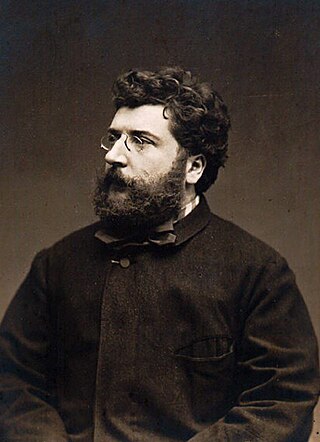
Georges Bizet was a French composer of the Romantic era. Best known for his operas in a career cut short by his early death, Bizet achieved few successes before his final work, Carmen, which has become one of the most popular and frequently performed works in the entire opera repertoire.
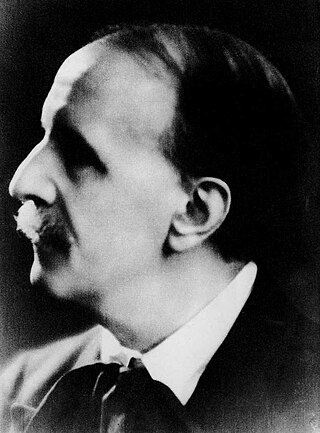
Louis Victor Jules Vierne was a French organist and composer. As the organist of Notre-Dame de Paris from 1900 until his death, he focused on organ music, including six organ symphonies and a Messe solennelle for choir and two organs. He toured Europe and the United States as a concert organist. His students included Nadia Boulanger and Maurice Duruflé.

Paul Marie-Adolphe Charles Paray was a French conductor, organist and composer. After winning France's top musical award, the Prix de Rome, he fought in the First World War and was a prisoner of war for nearly four years. He held a succession of chief conductorships, including those of the Lamoureux and Colonne Orchestras in Paris and the Monte-Carlo Philharmonic Orchestra in Monaco. For ten years from 1952 he was chief conductor of the Detroit Symphony Orchestra, with which he made a celebrated series of recordings for Mercury Records' "Living Presence" series, many of which have been digitally released in the 21st century.

César Auguste Jean Guillaume Hubert Franck was a French Romantic composer, pianist, organist, and music teacher born in present-day Belgium.

Pablo Martín Melitón de Sarasate y Navascués, commonly known as Pablo de Sarasate, was a Spanish (Navarrese) violinist, composer and conductor of the Romantic period. His best known works include Zigeunerweisen, the Spanish Dances, and the Carmen Fantasy.
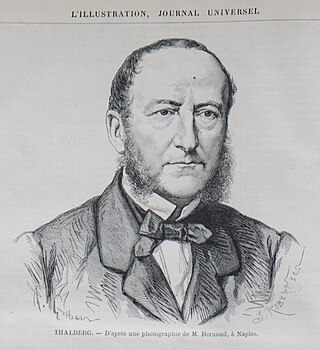
Sigismond Thalberg was an Austrian composer and one of the most distinguished virtuoso pianists of the 19th century.

Claude Antoine Jean Georges Napoléon Coste was a French classical guitarist and composer.

Cantique de Jean Racine, Op. 11, is a composition for mixed choir and piano or organ by Gabriel Fauré. The text, "Verbe égal au Très-Haut", is a French paraphrase by Jean Racine of a Latin hymn from the breviary for matins, Consors paterni luminis. The nineteen-year-old composer set the text in 1864–65 for a composition competition at the École Niedermeyer de Paris, and it won him the first prize. The work was first performed the following year on 4 August 1866 in a version with accompaniment of strings and organ. The style shows similarities with his later work, Requiem. Today, the two works are often performed together.

Isidor Edmond Philipp was a French pianist, composer, and pedagogue of Jewish Hungarian descent. He was born in Budapest and died in Paris.
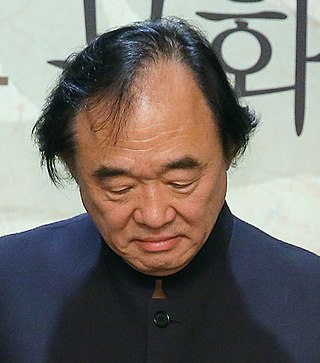
Kun-woo Paik is a South Korean pianist. He has performed with multiple orchestras, including the London Symphony Orchestra, the BBC Symphony Orchestra, and the Saint Petersburg Philharmonic.

Jules Auguste Demersseman was a French flautist and composer.
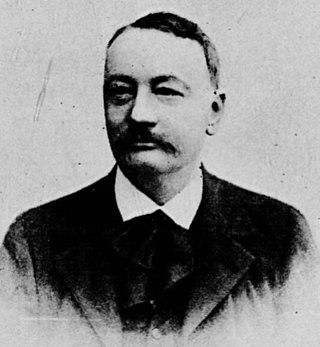
Jean Émile Auguste Bernard was a French Romantic composer and organist.

Théophile Édouard Laforge was a French violist and first professor of viola at the Conservatoire de Paris.

Jean-Henri Ravina was a French virtuoso pianist, composer and teacher.

Steven Spooner is an American pianist, and currently Professor of Piano at the Peabody Institute in Baltimore, Maryland.

Alexandre Édouard Goria was a French virtuoso pianist and composer recognised among amateurs enthusiasts for his numerous salon pieces of different styles, which enjoyed great success at their time. The number of fancy arrangements and transcriptions by Goria of selected motifs from great operas proves the composer's great facility and the popularity of his name, which had commercial value. He was a favorite artist of lovers of brilliant music, concert and salon music.
Michel Léon Chapuis was a French classical organist and pedagogue. He was especially known as an interpreter of the French and the German Baroque masters and dedicated to historically informed performances.
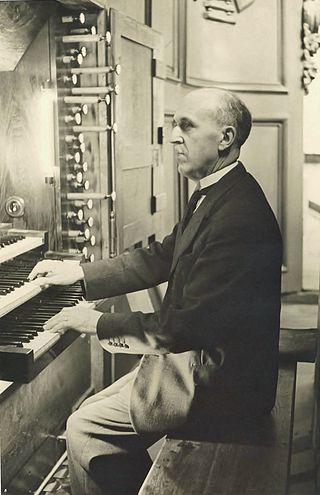
Émile André Poillot was a French pianist, organist, and pedagogue.

Antoine Aimable Elie Elwart was a French composer and musicologist.

Maurice Bourgue was a French oboist, composer, conductor, and academic teacher who made an international career. He was principal oboist with the Orchestre de Paris from its foundation in 1967 until 1979. He founded a wind octet of members of the orchestra in 1972, for performing and recordings. He taught chamber music at the Conservatoire de Paris and the Geneva Conservatoire. Bourgue played in world premieres, such as Les Citations by Henri Dutilleux in 1991.




















